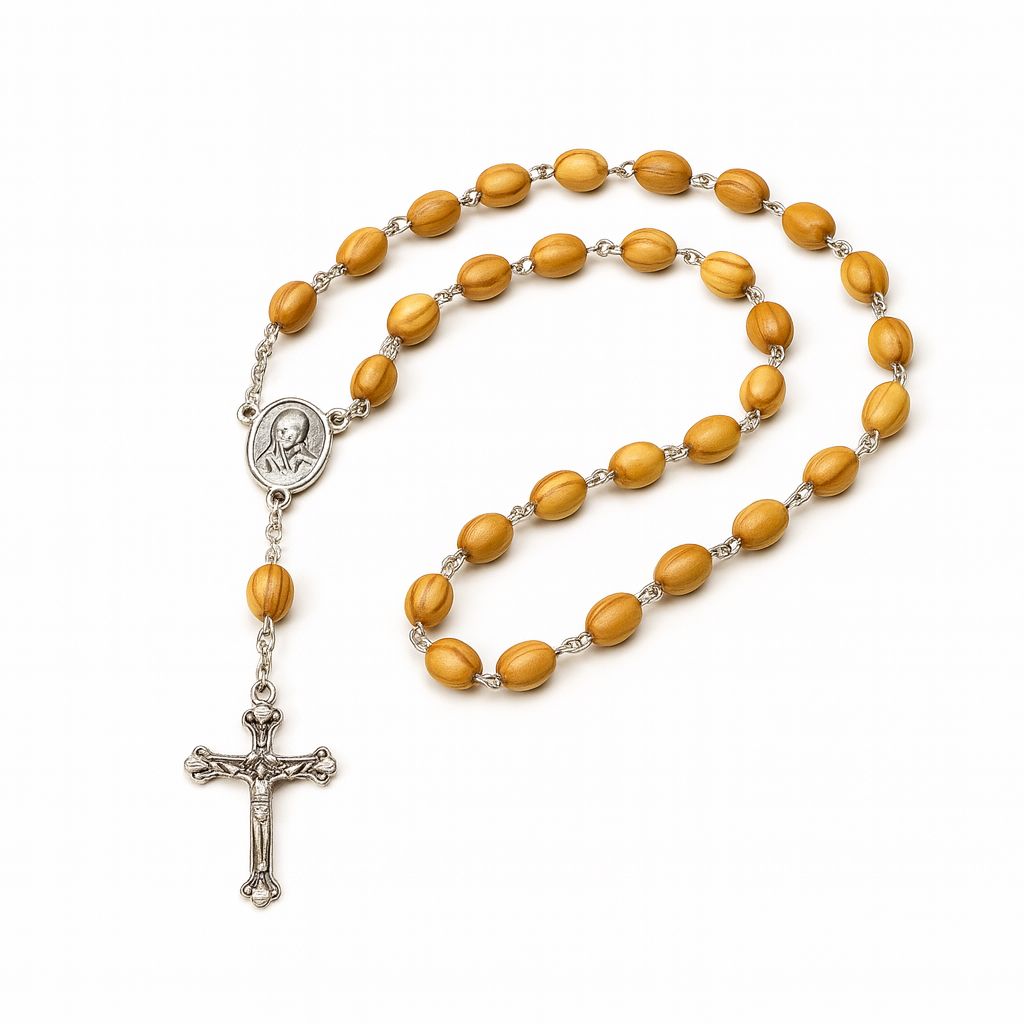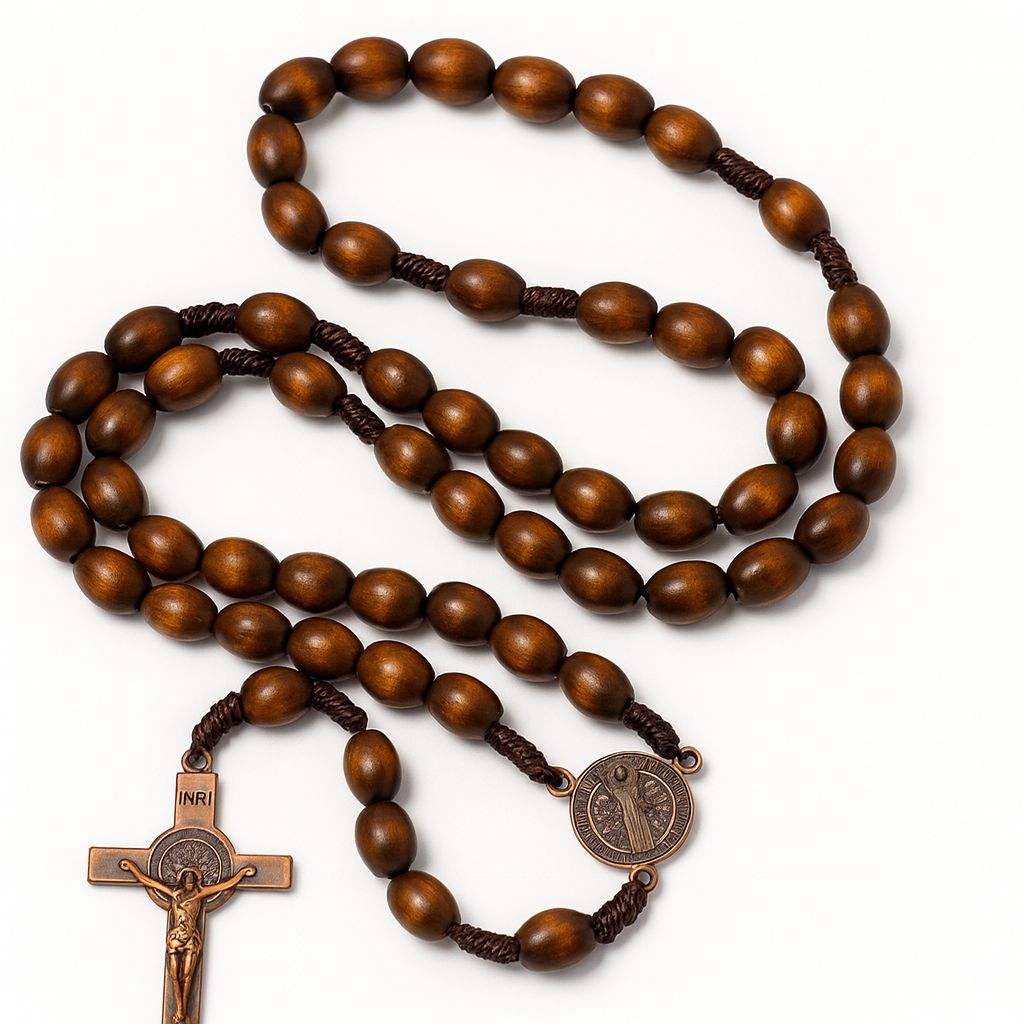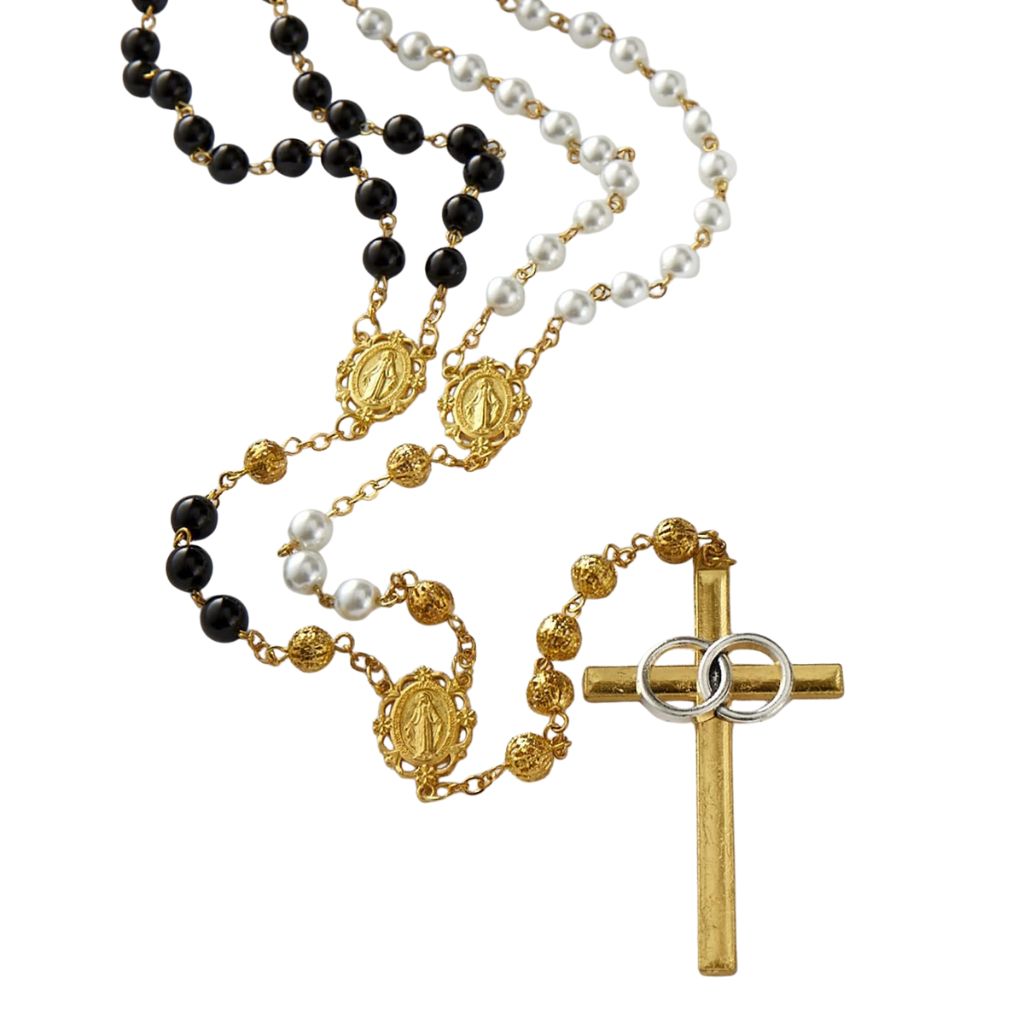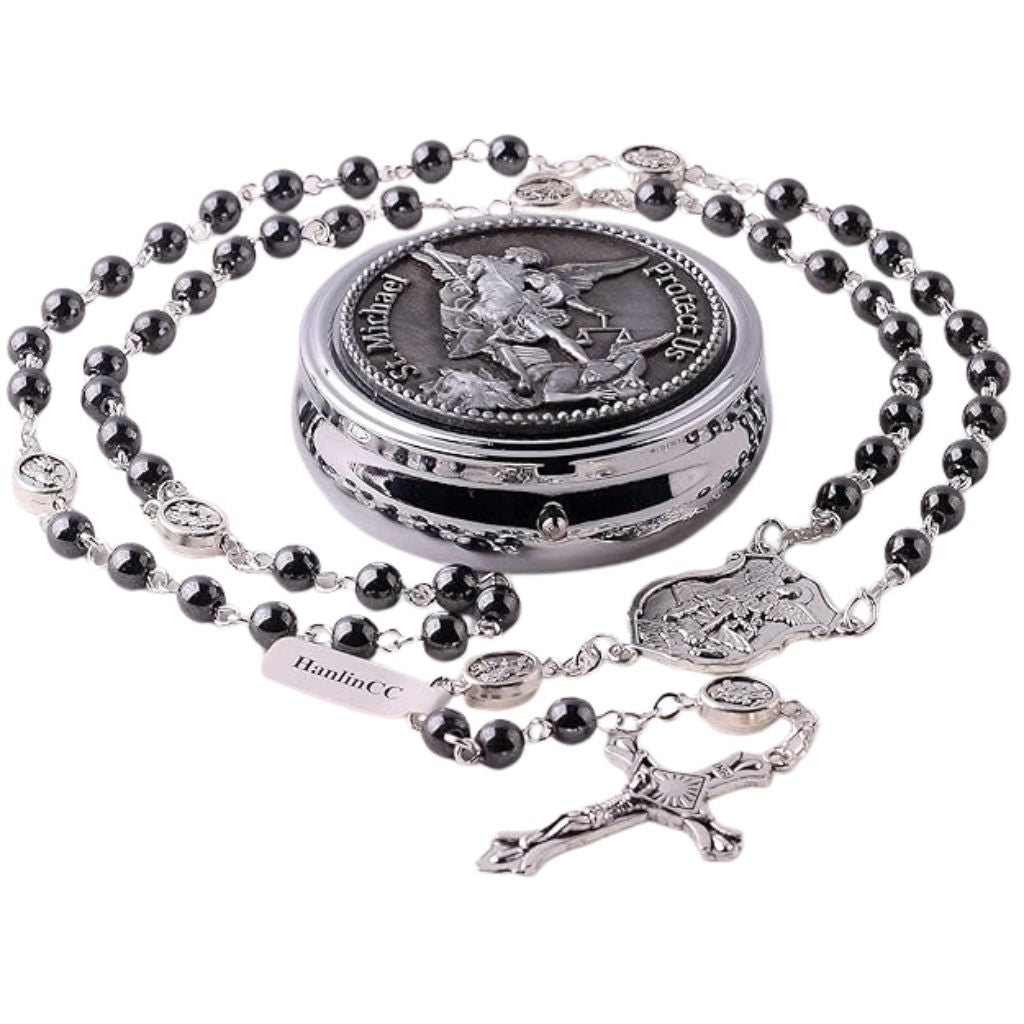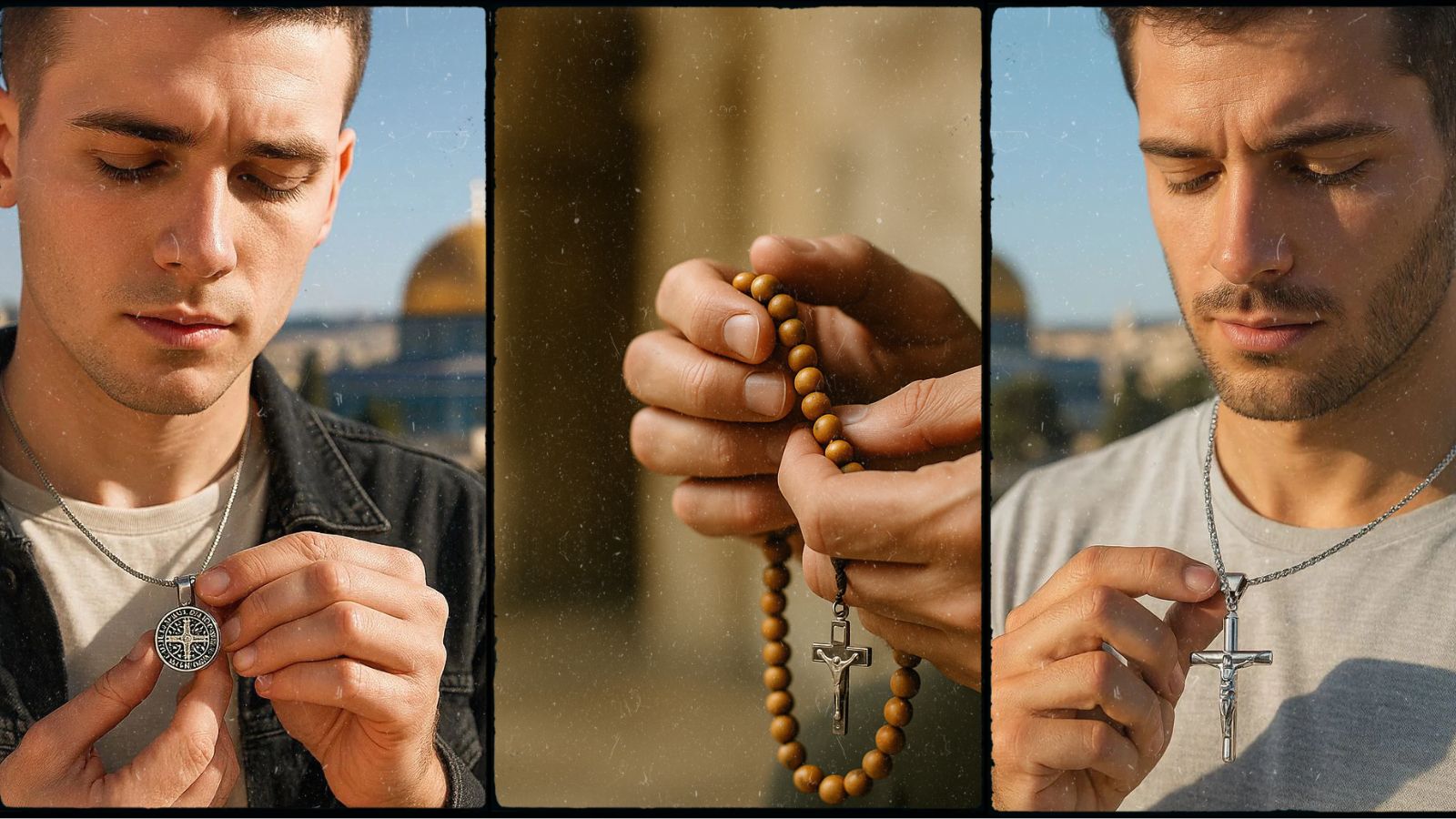Choosing between wooden rosary beads and a wood rosary can feel overwhelming—especially when you want a piece that will truly serve your prayer life. In this guide, crafted for the faithful, we compare materials, prayer feel, care, and prices, with special attention to items handmade in Jerusalem and available to be blessed at the Church of the Holy Sepulchre.
Why This Topic Matters for Christians
Prayer is not merely information—it is communion. The rosary places the mysteries of Christ and the tenderness of His Mother right into our hands. The material we hold shapes the rhythm of prayer: the texture, the weight, the sound each bead makes as we move from Hail Mary to Hail Mary. Choosing between wooden rosary beads and other materials is therefore both practical and devotional.
When your rosary is handcrafted in Jerusalem, made by Christian artisans who live where Jesus walked, it carries a tangible connection to the Holy Land. Many of our pieces can be blessed at the Church of the Holy Sepulchre—the site of Our Lord’s Passion and Resurrection—making your rosary not only an object for prayer, but a small pilgrimage you can carry daily.
For a deeper look at options from the Holy Land, explore our collection of Rosaries from Jerusalem, each one designed to accompany your daily conversation with God.
How to Choose: A Simple Framework
Use this three-part discernment to decide whether a wood rosary or another material suits you best:
-
Prayer Style & Setting
- Quiet, contemplative prayer (home, Adoration): lighter, warm-to-the-touch beads—often wood—help many pray longer without fatigue.
- On-the-go prayer (commuting, walks): durable cords or chains are essential; a smaller chaplet in wood or metal might be ideal.
-
Feel & Sensory Cues
- Wooden rosary beads offer warmth, a gentle grip, and a soft, natural click.
- Metal or stone beads feel cool and weighty, with a more audible clink that some find grounding.
- Glass gives smooth glide and visual beauty; olive wood has grain patterns that tell a story.
-
Longevity & Maintenance
- Wood ages beautifully when cared for; it also absorbs the oils of your hands, subtly darkening over time.
- Metals resist abrasion but can tangle if links are thin. Stone/glass resist scratches but may chip if dropped.
Quick rule of thumb: If your top priority is devotional warmth and Jerusalem heritage, start with a wood rosary—especially olive wood. If you want maximum heft and sheen, consider metal or stone, and compare the feel in prayer.
For inspiration, explore our Rosaries from Jerusalem, hand-finished by artisans whose families have crafted devotional items for generations.
Materials & Finishes:

Wood is not one thing—it’s a world of choices. Here are the most common woods and how they compare to non-wood alternatives. No matter which you choose, the heart of the matter is prayer: the right feel, the right weight, and a design that draws your mind to God.
Popular Woods (especially from Jerusalem)
-
Olive Wood (Jerusalem)
Pros: Iconic grain from the Holy Land; light-to-medium weight; warm touch; ages gracefully; unique patterns.
Cons: Can dry if neglected; avoid soaking.
Best for: Daily prayer, gifting with Holy Land significance. -
Ebony / Dark Hardwood
Pros: Dense, smooth, rich coloration; very durable; elegant.
Cons: Heavier; higher price.
Best for: Those who like a quiet, substantial feel. -
Rosewood / Beech / Maple
Pros: Balanced weight; smooth glide; approachable pricing.
Cons: Less “Holy Land specific” unless sourced there.
Best for: First rosary or everyday carry.
Non-Wood Alternatives
-
Metal (stainless, brass, silver)
Pros: Durable links; pleasing weight; classic look.
Cons: Can tangle; may feel cold; higher cost for precious metals. -
Stone (hematite, jasper)
Pros: Solid weight; tactile grounding; beautiful natural tones.
Cons: Can chip if dropped; heavier for pocket carry. -
Glass / Crystal
Pros: Luminous beauty; smooth glide; traditional gifts.
Cons: More fragile; can be heavy; occasional chipping. -
Cord / Paracord Hybrids
Pros: Very durable; great for outdoors; minimal tangle.
Cons: Less traditional look; bead material varies.
Finish & Hardware: Jerusalem-made wooden rosary beads often feature olive-wood beads with a pewter or sterling Crucifix and centerpiece (sometimes with soil, water, or a small relic-style capsule). The blend of warm wood and cool metal creates balance: the wood warms in your hands; the metal anchors the design.
See also: Crosses & Crucifixes to pair your rosary with a wall cross or wearable crucifix, all aligned with a reverent, Holy Land aesthetic.
Sizing, Fit & Usage Scenarios
-
Bead Diameter
- 6 mm: discreet, great for pockets and travel.
- 7–8 mm: most popular—easy to feel, not too bulky.
- 10 mm: bold, ideal for meditative pacing and display at home.
- Length & Drop: Longer loops assist in measured, rhythmic praying. If you walk while praying, a slightly shorter loop may prevent snagging.
-
Chain vs Cord
- Corded wooden rosary beads absorb motion without kinking and are quiet.
- Linked chain rosaries have traditional elegance but need occasional inspection for open links.
-
Where You Pray
- Home/Chapel: Choose the beads you find most prayerful—olive wood is a perennial favorite.
- Outdoors/Travel: Corded wood rosary with tighter knots and sturdy Crucifix is practical.
Care & Stewardship Tips
Think of your rosary as a companion you’re entrusted with—treat it with the same reverence you bring to prayer itself.
- Wipe after use with a soft cloth to remove moisture and oils.
- Condition wood sparingly, a couple of times a year, with a tiny amount of mineral oil or natural beeswax—never soak.
- Avoid extremes: protect from direct prolonged sun, high heat, or water immersion.
- Check connections: if chain-linked, inspect jump rings; if corded, check knots for looseness.
- Storage: a small pouch keeps it from tangling with keys—especially for glass/stone beads.
Gifting Guidance

A rosary is a profoundly meaningful gift. Consider the person’s prayer habits and the story you wish to tell. If the Holy Land connection matters, choose wooden rosary beads crafted in Jerusalem, and request a blessing at the Church of the Holy Sepulchre for a gift that unites your loved one to the places of the Gospel.
- Sacramental milestones: Baptism (for parents), First Communion, Confirmation, RCIA.
- Pastoral care: illness, hospital stays, grief, spiritual dryness.
- Life moments: weddings, anniversaries, new jobs, graduations, pilgrimages.
Learn more About JerusalemFaith—our mission, our artisans, and how blessings are arranged reverently and responsibly.
Common Mistakes & How to Avoid Them
- Choosing only by looks: Beautiful beads that don’t feel right in your hands may hinder prayer. Always consider feel and weight.
- Ignoring craftsmanship: With wood, look for smooth finishing, consistent knots/links, and well-set Crucifixes.
- Under-estimating care: A quick seasonal conditioning preserves luster and strength.
- Wrong size for context: Large 10 mm beads are prayerful at home, less convenient for pockets.
- Forgetting the Holy Land story: If that connection moves you, prioritize Jerusalem-made pieces and request a blessing.
Mini-FAQ
Q1: Are wooden rosary beads durable for daily use?
Yes. With simple care (wipe dry, occasional conditioning), wooden rosary beads serve daily prayer beautifully and age with character.
Q2: What makes a wood rosary from Jerusalem special?
The olive-wood grain, the artisans’ heritage, and the option to have it blessed at the Church of the Holy Sepulchre root your prayer in the landscape of the Gospel. A wood rosary from Jerusalem is both devotional and historical.
Q3: How do prices compare—wood vs metal, stone, or glass?
Wood (olive, rosewood, beech): typically most accessible; premium hardwoods cost more.
Metal (especially sterling), stone, and crystal: generally higher due to materials and weight.
Handmade Jerusalem pieces carry artisanal value and blessing arrangements, reflected fairly in pricing.
Q4: Will oils from my hands damage the beads?
No; they usually deepen the patina. Just avoid soaking and extreme heat.
Q5: Is a heavier rosary better?
Not necessarily. Some pray best with the warmth and lightness of wood, others with the gravity of metal or stone. Choose what keeps you praying.
Q6: Can I travel with a blessed rosary?
Absolutely. Keep it in a protective pouch and treat it with reverence as a sacramental.
Conclusion & Gentle Invitation
Whether you are drawn to the warmth of wooden rosary beads or the enduring simplicity of a wood rosary, let your choice be guided by prayer, craftsmanship, and the story you wish to carry. Our rosaries are handcrafted in Jerusalem, many blessed at the Church of the Holy Sepulchre, and offered so you can hold the Holy Land each time you pray.
